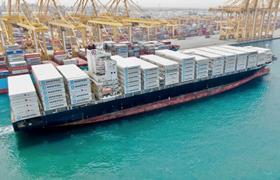
To offset the scarcity of reefer containers in South Africa ahead of this citrus season and to support the nation’s agricultural sector, Maersk has announced it has brought 1,800 empty refrigerated 40-foot containers from the Middle East as additional stock to serve customers.
According to the logistics group, there is additional supply to come and this will complement the refrigerated containers that are already in the country and available to customers.
The containers have departed Jebel Ali last weekend and are expected to arrive in Durban by early May, to be distributed among Maersk and Safmarine customers.
Reefer containers are currently scarce in South Africa due to the imbalance in trade flows, which has been impacted by the lockdown in China during the first quarter of 2020 and the expected stronger demand for South African fruit.
“Knowing the importance of the upcoming export season to our customers as well as the South African economy, Maersk remains committed to serve our South African reefer customers ensuring their fresh citrus continues to be delivered globally,” said Jonathan Horn, managing director for Maersk Southern Africa and Indian Ocean Islands.
“We will continue to support South African companies, industry and producers with viable solutions to work through the current challenging scenario to keep their goods moving,” he added.
Maersk offers multiple solutions to customers in South Africa such as phytosanitary certification, customs house brokerage, cold storage and a range of inland haulage solutions, while its array of digital offerings allows customers to continue their business online and to track goods worldwide using the company’s app.
Since February, Maersk said that it had developed several global solutions for customers to work through the current challenging trade scenario.
These include providing alternative sea and land routes, terminals, cold-storage depots in China and Russia, extra trucking services, rail services support and daily advisories, updating customers worldwide on how to keep their goods moving.



